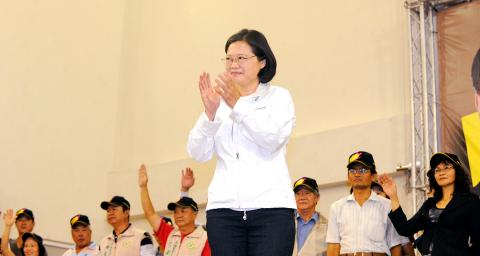Democratic Progressive Party (DPP) presidential candidate Tsai Ing-wen (蔡英文) is working hard and looking forward to the first of three crucial TV presidential debates, which will be held on Saturday.
With recent public opinion polls showing Tsai has overtaken President Ma Ying-jeou (馬英九), who is seeking re-election, in public support, Tsai will seek to solidify her lead in the presidential race with strong performances in the debates.
Candidates representing the Chinese Nationalist Party (KMT), the DPP and the People First Party (PFP) will take part in the debates, which will take place on Saturday, Dec. 10 and Dec. 17, and will be hosted by the Central News Agency and five other media outlets — Public Television Service (PTS), the China Times, the Liberty Times (the Taipei Times’ sister newspaper), the United Daily News and the Apple Daily.

Photo: Huang Chih-yuan, Taipei Times
The first debate will be held from 2pm to 4:30pm on Saturday and will be moderated by the organizing media outlets. The second will be moderated by representatives from NGOs.
The DPP is using Tsai’s speech at the American Chamber of Commerce in Taipei last week to prepare for the debates, as Tsai spoke immediately after Ma on that occasion.
The party said it was pleased with the results.
The debates will be more than just an opportunity to extend Tsai’s lead in the polls, but also an occasion for her to take “revenge” for the first debate between her and Ma last year, in which Ma was widely considered to have bested his opponent.
That debate took place in April last year, and centered on the Economic Cooperation Framework Agreement (ECFA).
While Tsai has long been known for her logic and recognized as an articulate speaker and a “thinker,” most analysts said after the debate that Ma was more successful in appealing to the audience, despite dodging most of Tsai’s questions.
Ma will not be Tsai’s only opponent this time, with PFP Chairman James Soong (宋楚瑜) also entering the debates as the third presidential candidate.
While Soong is expected to focus most of his attacks on Ma, he is unlikely to give Tsai much breathing room.

The manufacture of the remaining 28 M1A2T Abrams tanks Taiwan purchased from the US has recently been completed, and they are expected to be delivered within the next one to two months, a source said yesterday. The Ministry of National Defense is arranging cargo ships to transport the tanks to Taiwan as soon as possible, said the source, who is familiar with the matter. The estimated arrival time ranges from late this month to early next month, the source said. The 28 Abrams tanks make up the third and final batch of a total of 108 tanks, valued at about NT$40.5 billion

Travel agencies in Taiwan are working to secure alternative flights for travelers bound for New Zealand for the Lunar New Year holiday, as Air New Zealand workers are set to strike next week. The airline said that it has confirmed that the planned industrial action by its international wide-body cabin crew would go ahead on Thursday and Friday next week. While the Auckland-based carrier pledged to take reasonable measures to mitigate the impact of the workers’ strike, an Air New Zealand flight arriving at Taipei from Auckland on Thursday and another flight departing from Taipei for Auckland on Saturday would have to

A group from the Taiwanese Designers in Australia association yesterday represented Taiwan at the Midsumma Pride March in Melbourne. The march, held in the St. Kilda suburb, is the city’s largest LGBTQIA+ parade and the flagship event of the annual Midsumma Festival. It attracted more than 45,000 spectators who supported the 400 groups and 10,000 marchers that participated this year, the association said. Taiwanese Designers said they organized a team to march for Taiwan this year, joining politicians, government agencies, professionals and community organizations in showing support for LGBTQIA+ people and diverse communities. As the first country in Asia to legalize same-sex

MOTIVES QUESTIONED The PLA considers Xi’s policies toward Taiwan to be driven by personal considerations rather than military assessment, the Epoch Times reports Chinese President Xi Jinping’s (習近平) latest purge of the Chinese People’s Liberation Army (PLA) leadership might have been prompted by the military’s opposition to plans of invading Taiwan, the Epoch Times said. The Chinese military opposes waging war against Taiwan by a large consensus, putting it at odds with Xi’s vision, the Falun Gong-affiliated daily said in a report on Thursday, citing anonymous sources with insight into the PLA’s inner workings. The opposition is not the opinion of a few generals, but a widely shared view among the PLA cadre, the Epoch Times cited them as saying. “Chinese forces know full well that